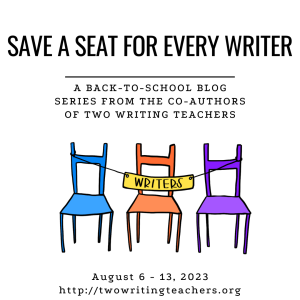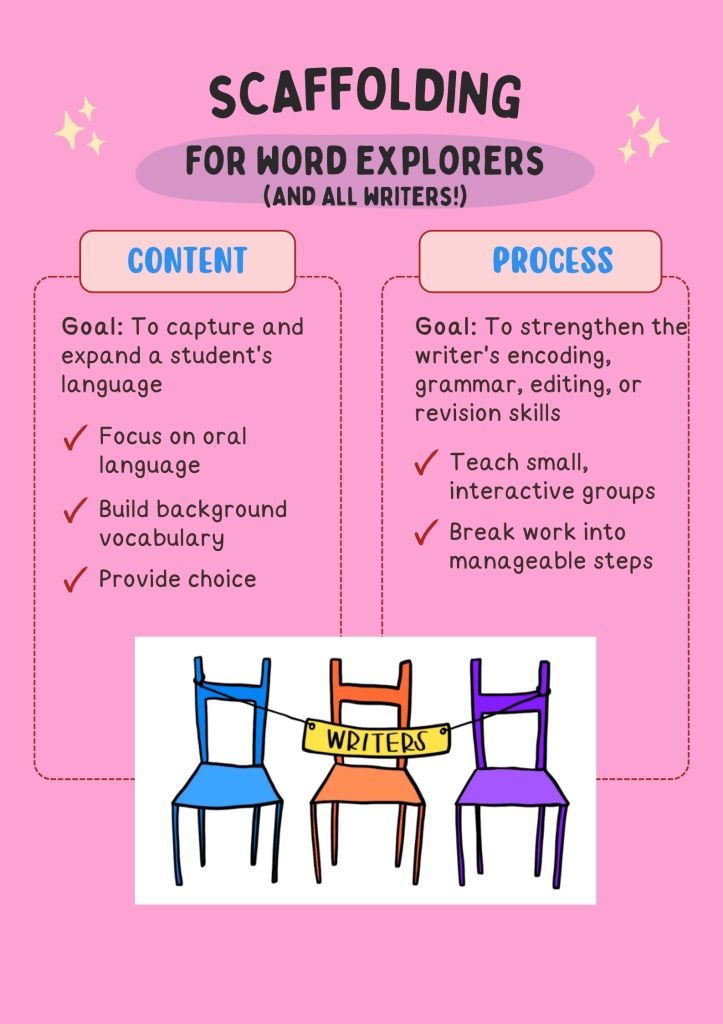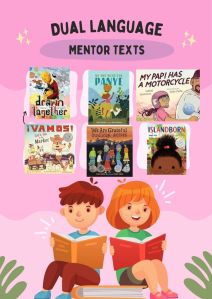Estimated Reading Time: 4 minutes. Contains 746 words
Target Audience: Classroom Teachers, EL Specialists, Special Educators
A Backstory: One of my non-negotiable habits as a writing teacher is releasing students individually after each minilesson. I ask students to establish a plan for writing each day–sometimes by telling me, other times by telling a partner, and occasionally by jotting it down–before transitioning from our group gathering area to their independent work space. Most students dive right in, clear about their purpose for the day. But a small number of students spend many days lingering behind. These kids are often my Word Explorers.
Who They Are: Word Explorers are the children in our classrooms who, for various reasons, need additional support or scaffolding to commit words to the page. Some of these students may be multilingual learners (a strengths-based identifier for students learning English) whose vocabulary includes more than one language. Others may have a diagnosed (or not-yet-identified) language delay or disability.
What They Bring: Like all young writers, these children bring their stories, interests, passions, and lived experiences to writing. They are curious and want to communicate, though they often need additional support to compose a message and transfer it to the page.
Finding the Right Seat: Word Explorers may find balancing the many tasks that go into writing–encoding, handwriting, grammar, vocabulary, process, craft, etc.–a heavier cognitive load than their peers. Their perfect seat has both an appropriate amount of scaffolding and a clear focus.
Scaffolding begins by considering what matters today. The ultimate goal, of course, is for every writer to put all of the pieces together. But when students have a known need for support with language, we want to begin by prioritizing the skills that students need now in a clear, focused, and logical way. Consider the following areas of focus:
- Content: If the purpose of writing is for students to develop the content of a piece (a personal narrative, “all about” piece, etc.), the goal is to capture and expand their language. Some strategies to try might include:
- Focusing on Oral Language. Invite students to tell a peer, audio record, etc. to rehearse what they want to say before trying to put it on the page. (Hint: this strategy is good for every writer in your classroom.) If students will benefit from additional support, consider using speech-to-text accommodations.
- Building Background Vocabulary. A child might have an extensive understanding of a topic but lack the words to create a written piece. Using multimedia resources (videos, photographs, etc.), paired with conversations, will support the language development students need when writing. This practice can be enhanced by connecting science and social studies content area learning with your writing workshop.
- Providing Choice. Even when we give students direction around the genre or focus of their writing, choice should always be embedded in the work. This practice allows them to select topics about which they do have the vocabulary and to take controlled risks by exploring areas in which they are interested.
- Process: If the purpose of writing is for students to focus on encoding, grammar, editing, revision, etc., the focus is more on the how than the what. You might try:
- Using Small Groups. Rather than asking students to engage in this work independently, try using interactive writing (or interactive revising/editing) or shared writing with some application to their own work in the small group setting. This will allow writers to engage in the work with support until they can apply it in their writing.
- Breaking Work Into Manageable Steps. Rather than giving writers a lengthy checklist, try scaffolding it by cutting it into individual tasks to do one at a time.
Elevating Word Explorers: Word Explorers who speak another language may not have all of the words in English to put into writing just yet, but they have the unique advantage of knowing more than one language. Dual language writing has grown in popularity in children’s books, so we can easily grab some of these titles as mentor texts to demonstrate that young writers can also pull in words from other languages. Here’s a short list to get you started:
- My Papi Has a Motorcycle by Isabel Quintero
- Vamos! Let’s Go to the Market by Raul the Third
- Drawn Together by Minh Le
- We Are Grateful: Otsaliheliga by Traci Sorell
- My Day With the Panye by Tami Charles
- Island Born by Junot Diaz
One Thing to Remember: As teachers of writing, our job is to help children capture their stories, ideas, and passions on the page. Word Explorers will grow in front of our eyes as they gain confidence, build language, and find purpose in their writing.
Giveaway Information: This is a giveaway of ABDUL’S STORY by Jamilah Thompkins-Bigelow, donated by Simon & Schuster. Readers must leave a comment on any SAVE A SEAT for EVERY WRITER BLOG SERIES POST by Sat., 8/12 at noon EDT and have a U.S. mailing address. The winner must provide their mailing address within five days, or a new winner will be chosen.






Thank you for the book list! Just what I needed.
LikeLiked by 1 person
Love these suggestions! What a great timely reminder as we start a new school year.
LikeLiked by 1 person
I really like the number of dual language texts that are available now as mentor texts. What an engaging way to get ELs to connect real stories to their own writing!
LikeLike
I find that sentence stems can be a real game changer for Word Explorers in both speaking and writing.
LikeLike